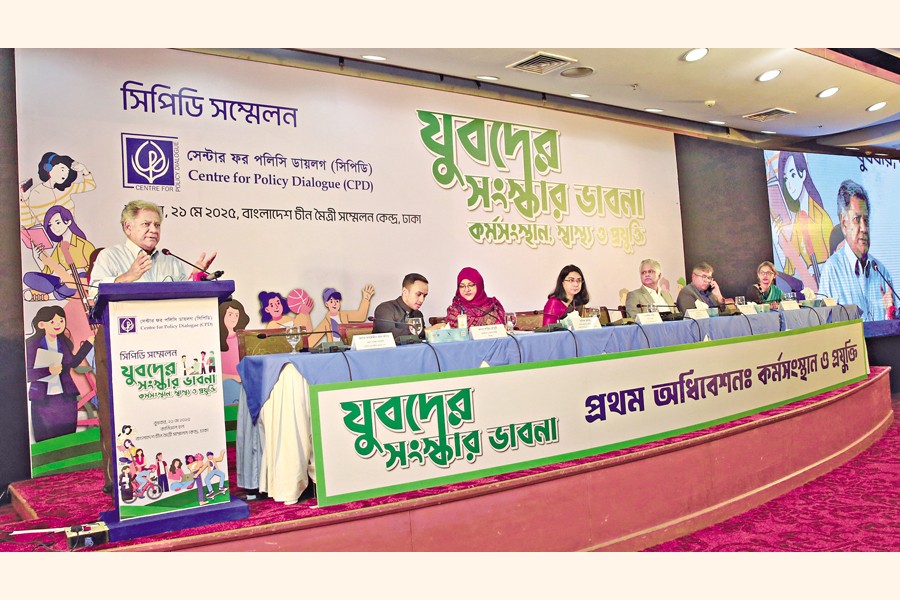
Published :
Updated :

Syed Nasim Manzur, president of the Leathergoods and Footwear Manufacturers and Exporters Association of Bangladesh (LFMEAB), on Wednesday urged young people to move beyond their fixation with government jobs, start-ups, and the desire to work abroad.
Speaking at an event, he emphasised that the future lies not overseas, especially not in Europe, where job opportunities are dwindling, but within Asia, home to over four billion people and a region with immense potential.
"There is no future abroad; the future is in Asia," he said, cautioning the youth against unrealistic expectations of foreign employment.
He also suggested the youth align their expectations with the need of the country's manufacturing industries and build careers as enormous opportunities are there.
Mr Manzur was addressing the inaugural session of a conference titled "Youth's Perspectives on Reforms: Employment, Health and Technology" and held at the Bangladesh-China Friendship Conference Centre (BCFCC) in the capital.
The event was organised by independent think tank Centre for Policy Dialogue (CPD).
Mr Manzur also warned against launching start-ups without adequate skills and real-world experience.
"Many start-ups are built on misinformation and end up wasting valuable resources," he said.
He stressed that genuine career growth requires hard work and sacrifice, noting that many young people avoid manufacturing roles and only aspire to have office-based desk jobs.
To enhance their employability, he encouraged the youth to focus on three core areas - manufacturing, management, and acquiring multiple skill sets.
He also underscored the importance of learning as many languages as possible to stay competitive in a globalised job market.
Critiquing the country's premature discourse on the Fourth Industrial Revolution, Mr Manzur remarked, "Bangladesh has not even fully transitioned through the Third Industrial Revolution. So why are we talking about the fourth?"
He urged the young people to pursue their own dreams with confidence, even if that means defying parental expectations.
"Say 'no' to your parents if needed. Align your skills with the evolving demands of the world and follow your own aspirations," he said.
Chairing the session, CPD Executive Director Dr Fahmida Khatun said one of the key reasons the July uprising happened is rising unemployment.
She said employment generation in the country is stalled as the private sector is not growing enough.
CPD Senior Research Associate Foqoruddin Al Kabir presented the keynote. He called for targeted efforts to close the digital gender gap by improving connectivity and equipping women and girls with digital competencies.
He noted that the National Skills Development Policy (NSDP) was designed to strengthen human capital and align the workforce with the needs of a fast-evolving economy.
Highlighting Bangladesh's demographic advantage, he pointed out that the country is currently in the midst of a demographic dividend - an opportunity expected to peak in the coming decades.
The youth are central to harnessing this potential, he said, noting that approximately 45.9 million people, or 28 per cent of the population, fall within the 15-29 age bracket.
The average age in Bangladesh stands at 27, according to the 2022 data from the United Nations Department of Economic and Social Affairs, he said.
Mr Kabir highlighted the urgent need to address both the digital and gender divides to ensure equitable access to technology for all young people in Bangladesh.
He underscored that empowering the youth with the tools to engage meaningfully in the digital world is critical for tackling unemployment, encouraging innovation, accelerating economic growth, and advancing social inclusion.
Besides, he emphasised that addressing the digital gender divide must begin with removing barriers to connectivity and equipping women and girls with the necessary skills to thrive in the digital era.
Speaking as the chief guest, Labour and Employment Adviser Brigadier General (retd) Dr M Sakhawat Hossain urged the youth to embrace modern technology to help Bangladesh meet emerging challenges and advance national development.
He noted that many Bangladeshi expatriates lack recognition abroad due to insufficient skills, stressing the importance of technical education for the country's youth.
Chief Executive Officer (CEO) of Bdjobs AKM Fahim Mashroor said Bangladesh now needs to send skilled workforce abroad, but the unskilled manpower should work in the country.
He identified the mismatch between demand and supply in the employment market that obstructs the planning of quality human resources.
Mr Mashroor urged financial institutions, including banks, to provide loans for acquiring skills for jobs, including in the foreign market.
Founder and CEO of Shikho Shahir Chowdhury urged the government to increase budgetary allocation for education to create quality human resources.
Co-founder and CEO of ShareTrip Limited Sadia Haque said digital literacy and technology education should be inclusive for women.
bdsmile@gmail.com


 For all latest news, follow The Financial Express Google News channel.
For all latest news, follow The Financial Express Google News channel.